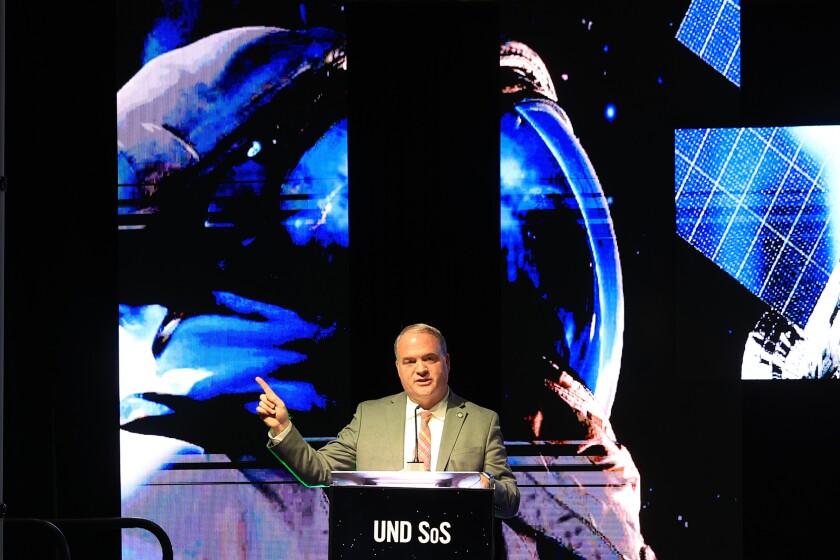GRAND FORKS — The inaugural Space Operations Summit at UND brought conversations about the past and future of the space field, featuring conversations about the intersection between space operations and aviation as well as how America will grow in competition with other countries.
The event was filled with speakers from across different space-related fields.
“Today we have an amazing lineup of speakers who will undoubtedly spark your interest in a wide array of ideas and thoughts,” UND President Andrew Armacost said in his opening remarks. “They’ll catalyze what we have come to refer to here at UND as the ‘sense of wonder’ — this idea that there is much to discover and explore and learn about.”
Paul Lockhart, retired U.S. Air Force colonel and NASA astronaut
Mary Christy, a representative of Republican U.S. Rep. Kelly Armstrong, said the field of space operations is complex, challenging and changing. The summit was important, she said, because it highlighted how UND, Grand Forks and North Dakota can be at the forefront of the field. Armacost also spoke about UND’s own involvement in the realm of space as a national leader in space education and space-related research. UND, he said, has a rich history of discoveries and education relating to space.
The presence of different groups in the crowd, Christy added, will be focal in the future of space technology, technology applications and services.
“Whether you’re in government, education, research, defense, your presence here today is incredibly important, as we’re seeing more actors good and bad focusing on space operations,” she said.
The summit had two keynote speakers: Michael O’Donnell, the deputy associate administrator of the FAA’s Office of Commercial Space Transportation, and Paul Lockhart, a retired United States Air Force colonel and NASA astronaut.
O’Donnell discussed the connection between space operations and aviation, as well as the regulations and licenses needed for space flight. As more and more objects and spacecraft are launched as the field expands and advances, O’Donnell said regulations and organizations need to expand with it. By 2030, the space economy’s growth is projected to reach $1 trillion to $2.4 trillion, he said. While the federal Office of Commercial Space Transportation, which sits at about 162 people, is expected to grow by three dozen people in 2025, O’Donnell said that is not enough for the progress that’s coming. As NASA, the U.S. Department of Defense, the FAA and other industry leaders talk about taking employees from each other, he said space programs like what UND has will be helpful to grow the number of people interested in the field.
“We’ve got a great aviation workforce that’s interested in coming into the space side,” he said. “But we need skill sets. We need engineers. We need policy people.”

Eric Hylden/Grand Forks Herald
Lockhart’s presentation focused on the space competition between America and China, which he previously wrote about in a 2004 paper assessing America’s space program and considering whether China presented a threat to America’s preeminence in space. His 2004 opinions have been proven wrong, he said, as China has shown a fast-paced improvement of their own space operations. He names the top three countries in the space field as — in order — America, China and Russia, with the gap between the former two closing in. The UND Space Operations Summit, Lockhart said, can springboard the university’s reputation and role as a place to develop the engineers, scientists and other professionals in the space field.
“In the Midwest, under these open skies, amongst the thriving oil fields and grain farms, this growing institution is full of innovation,” he said.
The summit highlighted more ongoing projects and innovations in space operations, and showcased local work by UND staff and students, such as an analog lunar Mars habitat, underwater space research and research on the threat of binary asteroids.
Randy Richards, field representative for Republican U.S. Sen. Kevin Cramer, said the people within the room and on campus who dare to make their dreams real will be the ones who “fulfill that need for humans to gain knowledge and take on new challenges.”
“They have a vision — in this case a space vision,” he said. “We will make our nation, the world a safer place.”
